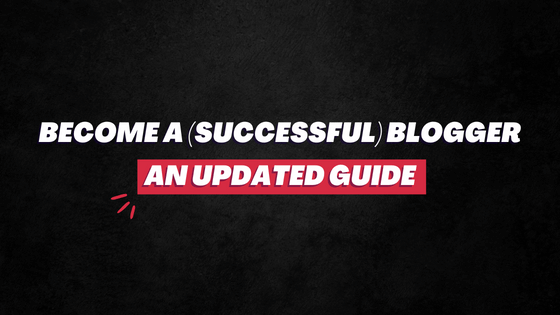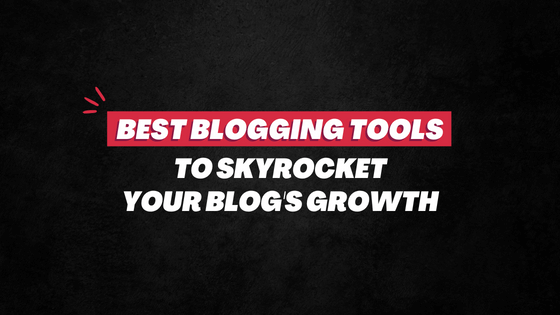It’s not just about writing. They have to wear multiple hats.
Caring about SEO, growing mailing list, pushing emails to subscribers, engaging the audience on social media, and so much more.
Phew…

This stress manifolds for the new bloggers who also have a full-time job (which isn’t uncommon, by the way).
In fact, many people start their blogging journey while also having a day job.
In this case, it is imperative that they ace time management.
With less time in hand and so many tasks to juggle with, they must be at their productive best.
But… How?
Here are 37 practical productivity tips for bloggers who have a full-time job:
1. Automate Your Social Media Posts
Instead of manually posting everything on your social media, use social media management tools (like Hootsuite and Buffer) to schedule your posts.
If you’re planning to update your social accounts 10 times, do you really want to go to individual platforms 10 times to post updates?
Exactly!
Automation tools will save you a lot of time and effort. In one go, schedule all your social media posts of different platforms, easily and quickly.
2. Write at least 4-week of blog post ideas in one-sit
Instead of going “what do I write today” phase every day, have your blog topics ready from before.
Sit down one day, do a bit of research and write down a month’s worth of blogging ideas.
To streamline their content and to avoid all the confusion, nearly every top blogger maintains an editorial calendar.
Check out how to create an editorial calendar.
Also read How to Find Blog Content Ideas: 13 (Very Easy) Ways
3. Race against time when writing

Break down your tasks into several 25-minutes slabs. And in between the first four slabs, take small breaks of anywhere between 3-5 minutes.
Move on to add longer breaks of 15-minutes in the fifth and following slabs.
Set a timer and try to do just as much as possible in those 25-minutes.
This will push you to do more in a given time. And the small breaks will help you stay fresh.
The time management method is also known as the Pomodoro Technique.
Recommended Read: How To Write Content Fast (23 Tips That Will Change Everything)
4. Create an outline of your article first
This a basic writing tip. Sadly, many bloggers don’t follow it.
Create an outline or structure of your article first. Then start adding important information under every head and sub-head. Expand the copy into an imperfect draft.
Move on to write the opening paragraph and the conclusion. These are the two most important parts. And they also take a lot of time. So you should always leave them for the last.
Once the draft is complete, edit it several times. Proofread it. And your final copy is ready now.
Avoid spending too much time in writing a perfect first paragraph when the “meat” of your content is still not ready.
5. Follow defined steps when starting to write
Set definite steps on how you’re going research on the topic, concept your ideas, and then write. Follow these steps until they become a habit.
It’ll help you avoid confusion and fight back that “I-have-so-many-things-to-do” mindset.
Here’s the process I have:
- I usually have blog topics at ready.
- Before writing I do keywords research and jot down all the important ones.
- Then I start writing (and complete it).
- Then comes finding and editing images for the post.
- Then I revise the post and make necessary edits.
- Take a break of 15-30 minutes.
- Now proofreading time….
- The post goes live!
6. Reply to emails and messages during the commute

You likely spend a lot of time commuting, back and forth from home to office. Utilize this time well.
Reply to all the important emails and messages during these hours.
Communicate with your audience on social media. Answer their questions. Ask them questions.
7. “Is this going to help me reach my blogging goals?”
Yes, this question may sound too cliché but you should ask it to yourself anyway.
Sometimes we get too involved in small things that we totally overlook what’s more important.
So to keep yourself on track, ask yourself if what you’re doing right now will help you reach blogging goals.
8. Find music that keeps you on your toes

The right music can help you pull your thoughts together, avoid distractions and be more motivated.
So find yourself some pleasant or motivating songs or instrumentals. And then tune them in when working on your blog.
How about this one…
9. Bookmark all the important websites
The photo editing websites, image finders, proofreading platforms, keywords research tools, timers, social media management tools, and more…
Bookmark all these important websites cleanly in one folder.
So the next time when you need them, you won’t frantically have to go ‘what was the name of that website?’
10. Don’t use website/platform that’s complex

Don’t just blindly follow others’ recommendations to use particular tools. Avoid using platforms or solutions that are too complex and you don’t understand properly.
Trying to figure things out will only waste your time. Go for their easier alternatives.
For example: If you’re not comfortable editing images on PicMonkey, go with MS Word or PowerPoint; you can easily edit your pics using these.
11. It’s okay you can’t publish articles every day
You might be tempted to publish articles every day. But that’s not always possible.
After working hard the whole day at the office, you’re going to feel tired someday.
So, change your content strategy.
Be consistent but put a limit on quantity. In the early dasys when you’re just starting, focus on quality. Even if it’s weekly or one post in 15-days, make sure the content is solid.
12. Set aside some time for all the distractions
You want to watch that latest movie. You have to call your BFF right now. You have to try the new restaurant in your locality. You have to scroll down your Facebook feed to see what’s new.
Such distractions are common. They will always creep in when you’re working on your blog.
Don’t ignore them! Simply set aside some later time for them.
Instead of saying “I don’t want to watch that movie” (when, in fact, you want to), say “I’ll watch it once I am done writing this article.”
13. “Is it really that important for now?”

Feeling overwhelmed is quite common when there are just so many things to do. So at times like these, it’s important that you set your priorities right.
Always ask yourself—is it really very important to complete “this” over “that” RIGHT NOW?
If yes, do it. If not, ask this question for the next tasks or distractions until you find the most important thing that needs to be done.
Example:
“Is it really important to check and reply to my emails right now?” Yes or No?
“I am supposed to do keywords research—but is it more important than scheduling my social media posts?” Yes or no?
Point is, you must find the most valuable or highest-rewarding tasks at any given time.
14. Practice a clear routine for the next 21 days
You get up early. Do your daily chores. Work on your blog a bit. Go to Office. Come back home in the evening. You start writing and working on your blog. You then read a bit. And fall back to sleep.
This is a simple and pretty decent daily routine for part-time bloggers.
Sort out your daily routine.
Write down what needs to be done every day and when you’re going to do those things. Make it realistic and efficient.
Now follow that exact routine for the next 21 days. And it will eventually turn into a habit.
Note that there is no scientific proof if 21-days is the right duration to form new habits. But it has been believed traditionally.
In any case, if you have managed to keep on with this routine for 3 long weeks, it would definitely be much easier now. Whatever you do now will come much more naturally.
15. Don’t bring your office to home
This is a big no-no. Never bring your office work to home, even when you’re getting incentives for that.
If you’re serious about panning your blog into something big and more profitable, it should be your highest priority outside the office.
Even if you don’t want to work on your blog tonight, rest and save yourself from the burnout. But never mix your office work with your personal life.
Let’s admit it — most of us know we’re wasting much of our time on the likes of Facebook and Twitter. Sadly, only a handful of people take the right measures to counter that problem.
How many hours do you spend scrolling through your social feeds?
Stop that!
Find something better to do. Like read something valuable and interesting or talk to your audience.
17. Keep a notebook with you for free writing

Free writing is basically writing for a set period of time without caring about spelling, grammar, and topic. You just write whatever comes to your mind.
This is a very effective method to get your creative juices to flow, add fluidity to your writing and improve your writing speed.
Keep a notebook with you all the time. Whenever an idea comes to your mind, start free writing on that particular topic.
Whether it’s an idea for your next blog post or a growth strategy, write it down.
And when the next time you will sit to work on your blog, these notes will be of great use.
18. Do the easy things first
All those quick and easy things — do them first.
When you’ll complete these tasks, you’ll feel a sense of accomplishment. This will motivate you. And you’ll be able to do the important things better with more energy.
19. Download best productivity apps on your phone
Your smartphone can help you to be more productive.
There are many such Android and iOS apps available for free that you can download to add to your daily efficiency.
Here are a few of my favorite productivity apps:
- Evernote- With cross-platform integration and powerful features, it makes taking notes easier.
- Trello- If you work in a team, this one could just be the best app for you. Its interface is very beautiful and smooth.
- Google Drive- Access your documents from anywhere and from any device.
- Microsoft Office- This is a must of course; to access and create documents.
There are many other cool apps. Check out a list of productivity apps on TechRadar here.
Know your needs and download apps accordingly.
20. Ask a friend for proofreading
When you’re done creating the draft, editing and proofreading the article yourself, ask any of your friends to help.
Ask them to proofread the final copy.
A third-person’s opinion and checking can help you minus down on the possible errors much easily and quickly.
21. Keep motivations around you all the time

Write down a few motivational quotes on sticky notes and put them around where you sit to work. Pack your phone with motivational songs.
Read success stories in your niche regularly. Follow your role model closely.
When motivation is around you, you will find it much easier to push yourself to improve your productivity.
22. Keep documents, images and everything else organized
A clean environment transcends into clearer thoughts. This then results in quick and efficient thinking that eventually turns into higher productivity.
So not only keep your desk organized but also, on your laptop/desktop, have your blog-related documents, images, clips, and more in one place.
Make sure that finding anything, anytime is quick and easy.
23. Conduct a weekly analysis
What went wrong in the last 7 days? Why didn’t you publish the number of articles you planned?
What was that one thing that took most of your time?
Did you waste a lot of your time this past week? Did you manage to give a sufficient amount of your time to different components of blogging?
Ask these questions every week to analyze your weaknesses, strengths, wins, and losses.
Learn from them and then prepare yourself for the next 7-days.
Recommended Read: 15 Things That Will (Silently) Destroy Your Blog
24. Have answers to the most Frequently Asked Questions
There are likely a few questions that all your readers ask.
Instead of answering them individually, create an FAQ page and answer these common questions, together, comprehensively.
Now anyone asks you the repetitive Q, push them the link of this FAQ page.
25. Know today what you’re going to do for your blog tomorrow

Meaning to say, plan your day in advance.
Before going to bed tonight, know what exactly you’re going to do the next day.
Are you going to write a new article tomorrow or focus more on social media marketing? Will you be working on your backlink strategy or update the old content?
Things would become much easier and organized if you know exactly what needs to be done.
26. Keep an eye on the watch all the time

Those ‘harmless’ few minutes on YouTube can unnoticeably turn into hours.
Your “simple” research work before writing an article can turn into wasted hours in no time.
So whatever amount of time you’re supposed to be working on your blog, make sure you keep an eye on your watch. Keep track of how you’re spending your time.
After all, the first rule of time management is knowing what you’re doing during that time in the first place.
27. Use your office breaks efficiently
Do you get breaks during office hours? How well do you utilize these breaks?
Instead of scrolling through your feed and gossiping with your colleagues, can you manage to work for a few minutes on your blog?
Use such off-times to do small tasks — like check for errors on your blog, reply to emails, follow your industry leaders, and find images for your next blog posts.
28. Take breaks between tasks to chill

Taking breaks in between is very important. If you work in a long stretch, you will eventually get bored and your mind will start wandering.
Meaning, even when you’re working “dedicatedly”, you’ll be much less productive.
According to a study, the most productive employees work for 52-minutes and then take a 17-minute break. During this break of 15-20 minutes, they totally disengage themselves from the work and get their mind refreshed. (Source)
Another study claims that people who work in 90-minutes spurts could be more effective and productive. (Source)
See what’s more suitable for you.
In any case, just make sure the work-break time you’ve planned is strict and doesn’t stretch beyond the limit. Form a habit.
I personally work for 45-minutes and then take 15-minutes off. Works great!
29. Eat energy-boosting foods
You’re back home after a long day at work. You’re already tired. And now you have to work for a few hours on your blog.
It’s very tough!!
What can help you here are energy-boosting foods. Now, they won’t magically turn your fatigue into high-spirit. But you will feel a bit more energetic.
Your tummy won’t feel bloated and you will definitely not feel like sleeping.
You don’t have to alter your diet 360 though. Just start making a few small changes in your meals and snacks.
Some of the best energy-boosting food include nuts, hard-boiled eggs, lemon water, whole-grain toast, sweet potatoes, and fresh fruits.
Here’s a list of few more food items that will help.
Note: Avoid Energy Drinks!
30. Know what will relax your mind

Different people use different techniques to tame their anxious mind and relax.
Some listen to soothing songs, others walk under the open sky. Some hit the gym, others take a power nap.
Identify what helps you get to that relaxing state; how you can find your complete peace of mind. Then practice these techniques when you’re stressed or during breaks.
Here’s a list of 100 ways you can relax and calm your mind.
31. Postpone the un-immediate tasks to the weekends
Saturdays and Sundays are the golden time. Instead of lying around on bed the whole day in the name of imagined burnout, get some work done.
During the weekdays, push all the small and less immediate tasks for the weekends.
Like analyzing your social media reach and engagement rate, guest blogging, fixing your blog design and so forth.
In short, make Saturdays and Sundays the most rewarding days in your blogging journey.
32. Keep a record of “time wasted” everyday
When you know what’s wrong, you can fix it easily.
So keep a record of how and in what ways you’re wasting your days and weeks.
Is there something that’s taking too much of your time? Are you spending your time on irrelevant things? Are you underutilizing your commute time?
Find the loopholes in your time management and fix them properly.
Recommended Read: 24 Ways Bloggers Waste Their Time (Only To Regret Later)
33. Set deadlines for all important tasks

Setting deadlines put a chip on your shoulder that pushes you to complete the task within the time frame.
At the office, do you not do those tasks quickly that come with deadlines than those that you can do “later”?
Exactly!
Whether it’s writing new posts, conducting a webinar, approaching industry leaders for help, set a cut-off time for each.
And you will find yourself completing that task much quickly and efficiently.
34. Follow Seinfeld’s Productivity Technique
You simply put up a big one-page calendar on your wall.
Now before retreating to your bed every night, put a red-cross mark on that particular date if you think you did something worthy and productive for your blog that day.
Keep doing this; keep putting the X mark on dates by working hard every day.
After some time, you will find a chain of these red crosses. Do not break the chain.
There will come a time when all you would want to do is to continue that chain of crosses. You’ll be motivated to accomplish this task every day.
You will be more enthused to work on your blog because you want to put up another cross on the calendar.
Read more on the technique here.
35. Avoid multitasking
When you’re trying to do everything at the same time, you’ll fail to achieve even one. Because multi-tasking doesn’t work for all.
Your attention is all diversified. You’re not focused.
This brings irregularity in your workflow, which eventually affects the quality of your outcome.
Stressed, anxious and edgy in the crowd of ‘so-many-things-to-do’, you ultimately become much less productive.
Take up one task at a time.
36. Take notes when reading anything worthy

You read something cool in an article and thought you would use that piece of information in your own next post.
Sadly, you didn’t take note of it.
Now you’re writing something. You want to use the information you read earlier. But you don’t exactly remember what it was.
Since you didn’t write down that information separately, you’re going to spend your time re-finding it.
This is quite a common occurrence.
Counter it by writing/copying down all the important and relevant information you come across while reading in one single place.
37. It’s okay!! It was an unproductive day—not a whole month
Stop cursing yourself. Don’t be so hard. You were too tired today so you didn’t work. Chill out. It was an unproductive day and not the whole month.
You’re a champ. You will buck up tomorrow.
Also, check out the list of Free Blogging Tools that would make your life easier.
Recommended Read:
- 14 Warning Signs Your Website Has Bad Quality Content
- How to Make Your Content More Engaging (15 Practical Ways)
For more on content marketing strategy and SEO to boost traffic, follow Spell Out Marketing on Twitter! 🙂



